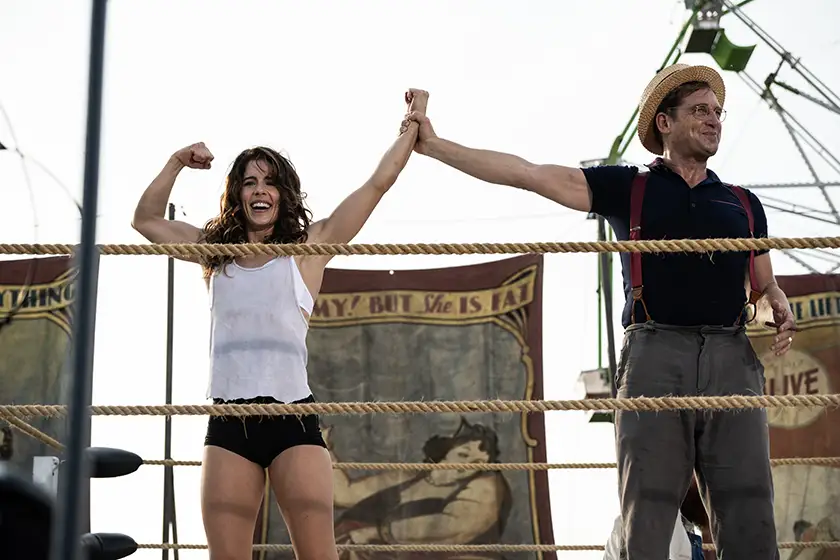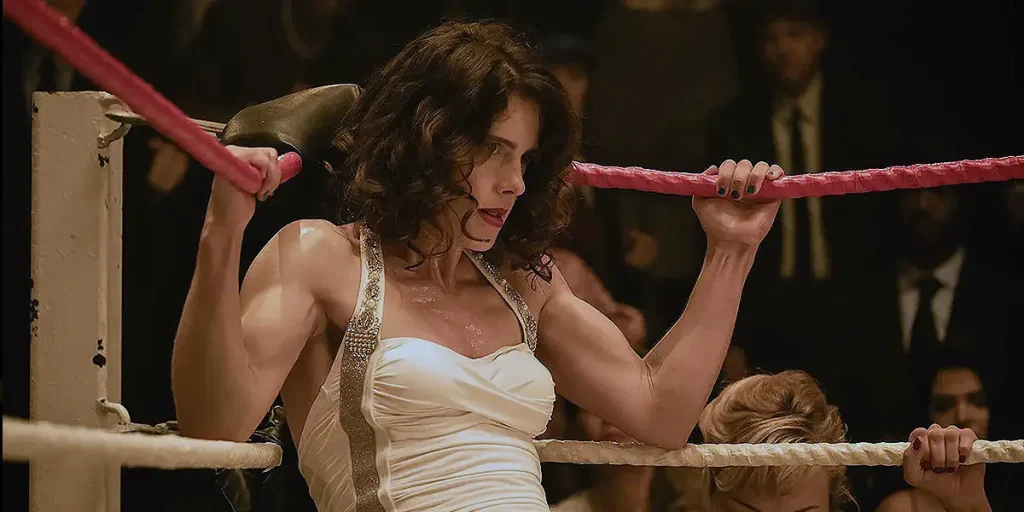Queen of the Ring boasts great performances and style, but a weak script and historical inaccuracies leave it feeling superficial.
Director: Ash Avildsen
Genre: Biopic, Sport, Period Drama
Run Time: 140′
Rated: PG-13
U.S. Release: March 7, 2025
U.S. Re-Release: May 9, 2025
U.K. Release: TBA
Where to Watch: In select theaters and digital platforms
It’s hard not to get excited when a movie promises to tell the story of a true trailblazer like Mildred Burke, especially for someone like me, who grew up glued to wrestling every Monday night. As a young fan of WWE, it was inevitable that I’d stumble across Burke’s name, and when I did, she felt larger than life: a woman who fought her way into a world that didn’t want her there, and made history doing it. Queen of the Ring felt like it was made for me and I am happy that her story is finally being told on the big screen.
It sets out to capture that incredible journey, and while it certainly has its moments, bolstered by strong performances, impressive production design, and some terrific wrestling choreography, the film ultimately feels like a missed opportunity. Good intentions alone aren’t enough to overcome a very weak screenplay, shallow direction, and some puzzling historical inaccuracies that sap much of the story’s power.
The film opens on a strong note: we first see Mildred (Emily Bett Rickards) mid-fight in a smoky underground ring. As the roar of the crowd fades, a voiceover takes over, with Mildred reflecting on her time working as a waitress and explaining the cultural forces stacked against women like her. In just a few minutes, the movie smartly frames the stakes: in a world where women are expected to be pretty, not powerful, Mildred isn’t just fighting for herself; she’s fighting against an entire system. It’s a genuinely gripping start, and it sets a tone that, sadly, the rest of the movie struggles to maintain.
One of the film’s biggest strengths is its authenticity in look and feel. The production design by Molly Coffee is not only impressive but immersive, pulling us deep into Depression-era America with dusty arenas, cramped diners, and the grungy, working-class aesthetic that shaped Mildred’s world. The wrestling choreography is equally well-handled; the matches feel brutal without falling into over-the-top spectacle. That realism goes a long way toward honoring the sheer physicality of what Mildred accomplished.

Emily Bett Rickards absolutely shines as Burke; it feels as if she disappeared into the role. Even when the script falters, Rickards anchors the film with a performance that’s far more layered and compelling than the writing often gives her credit for. Walton Goggins and Josh Lucas also bring solid work as wrestling promoter Jack Pfefer and Mildred’s trainer (and eventual husband) Billy Wolfe, respectively, but their characters, like so much else here, are painted in frustratingly broad strokes.
And that’s the crux of the problem: Queen of the Ring never really digs deep. Ash Avildson’s script and direction feel more interested in ticking biopic boxes than in exploring what truly made Mildred Burke revolutionary. Instead of capturing the complexity of her rise, the constant tension between ambition, survival, and the toxic men who tried to control her career, the film too often settles for a sanitized, surface-level version of events. The result is a movie that feels more like a greatest-hits montage than a lived-in, emotionally rich story.
Even more frustratingly, the film plays fast and loose with key facts, which is especially disappointing given that Mildred Burke’s real story is already dramatic enough without embellishment. For example, in the film, we see Mildred’s mother take her to a wrestling match where she first sees Billy Wolfe and immediately wants to become a wrestler herself. It’s a fine scene, but it’s completely fabricated; in reality, it was Mildred’s boyfriend at the time who introduced her to wrestling.
Similarly, the film portrays Mildred working as a waitress before getting into wrestling but leaves out that she was actually working as an office stenographer, which was a much more significant part of her background by the time her wrestling journey began. While yes, she was a waitress at some point in her life, it was way before she had gotten into wrestling.
Worst of all, Billy Wolfe is depicted as being generally against women’s wrestling, when in fact he was already training female wrestlers; he just didn’t want to train her. Granted, he was known for exploiting his female wrestlers, cheating them out of money, and controlling every aspect of their careers and personal lives. He was abusive, manipulative, and took full advantage of the power he held over women trying to break into the business, so he’s far from a figure worth defending, but it felt so odd seeing these fabrications when the truth is right there. These changes might seem minor to some, but they pile up, and for a fan who knows Burke’s story, they feel like careless oversights that undermine the film’s credibility.
To its credit, the movie’s heart seems to be in the right place: it’s clear that Queen of the Ring wants to celebrate Mildred Burke’s tenacity and pioneering spirit. However, the superficial execution leaves too much on the table. Mildred wasn’t just a woman who fought in the ring; she fought the whole system outside of it, too. The film gestures at that larger struggle but never fully grapples with it, leaving the final product feeling flatter and more conventional than it should.
In the end, Queen of the Ring had all the ingredients to be a knockout: an inspiring real-life subject, a fantastic lead performance, and a visually rich setting. But it settles for playing it safe, skimming the surface of a truly groundbreaking life rather than diving into its messy, painful, exhilarating depths. I think most audiences will like this film, but as a wrestling fan I was left disappointed. Mildred Burke deserved better. So did we.
Queen of the Ring: Movie Plot & Recap
Synopsis:
Based on the life of wrestling icon Mildred Burke, Queen of the Ring follows a single mother’s fight to break into the male-dominated world of professional wrestling and make history as the sport’s first million-dollar female athlete.
Pros:
- Emily Bett Rickards delivers a fantastic performance.
- Impressive production design and fight choreography.
- Strong and engaging opening scene.
- Walton Goggins
Cons:
- Bland, surface-level script and direction.
- Several frustrating historical inaccuracies.
- Fails to fully explore Burke’s complex story.
- Not enough Walton Goggins
Queen of the Ring will be returning to select theaters and available on digital platforms starting Mother’s Day Weekend, May 9, 2025.
Loud and Clear Reviews has an affiliate partnership with Apple, so we receive a share of the revenue from your purchase or streaming of the films when you click on some of the links on this page. This won’t affect how much you pay for them and helps us keep the site free for everyone.

